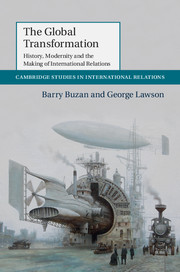Book contents
- Frontmatter
- Dedication
- Contents
- List of Figures
- List of Tables
- Preface
- List of Abbreviations
- Introduction
- Part I The Global Transformation and IR
- Part II The Making of Modern International Relations
- 3 Shrinking the Planet
- 4 Ideologies of Progress
- 5 The Transformation of Political Units
- 6 Establishing a Core–Periphery International Order
- 7 Eroding the Core–Periphery International Order
- 8 The Transformation of Great Powers, Great Power Relations and War
- Part III Implications
- Bibliography
- Index
3 - Shrinking the Planet
Published online by Cambridge University Press: 05 February 2015
- Frontmatter
- Dedication
- Contents
- List of Figures
- List of Tables
- Preface
- List of Abbreviations
- Introduction
- Part I The Global Transformation and IR
- Part II The Making of Modern International Relations
- 3 Shrinking the Planet
- 4 Ideologies of Progress
- 5 The Transformation of Political Units
- 6 Establishing a Core–Periphery International Order
- 7 Eroding the Core–Periphery International Order
- 8 The Transformation of Great Powers, Great Power Relations and War
- Part III Implications
- Bibliography
- Index
Summary
Introduction
The shrinking of the planet is a celebrated feature of contemporary globalization (e.g. Giddens, 1985; Held et al., 1999). This chapter shows not only how the shrinking of the planet took off during the nineteenth century, but also how it is that these earlier developments, more than those that took place during the twentieth century, mark the major disjuncture from previous periods of world history. Using the analytic of interaction capacity (Buzan and Little, 2000: 80–4), we show how both physical and social infrastructures assumed their modern forms during the nineteenth century. In terms of physical infrastructures, the agrarian world of horsepower and sailing ships, with its limited speeds and small carrying capacities, gave way to the industrial world of fast, mass transportation over land and sea, and global high-speed communication. As Landes (1969: 41) puts it, albeit in somewhat oversimplified terms, the move was from technologies that relied on human skill and animal power, plus vegetable and animal materials, to those that relied on machines, plus heat engines and minerals. This formulation neglects both the metallurgy and the use of wind and water power that bridge earlier periods and the nineteenth century, but it does capture the core elements of this aspect of the global transformation. Access to new forms of energy shrank the planet by transforming both transportation and communication. In this chapter, we show how railways, steamships, inter-oceanic canals and the telegraph impacted on the dynamics of the international system. We then show how these developments were extended by radio, telephone, aircraft, motor vehicles, rockets and, most recently, the internet. We also give some space to global monitoring (which is an offshoot of these developments) and its impact on awareness of the planet as a single system, which can be traced to the emergence of global climate surveillance during the late nineteenth century.
- Type
- Chapter
- Information
- The Global TransformationHistory, Modernity and the Making of International Relations, pp. 67 - 96Publisher: Cambridge University PressPrint publication year: 2015



